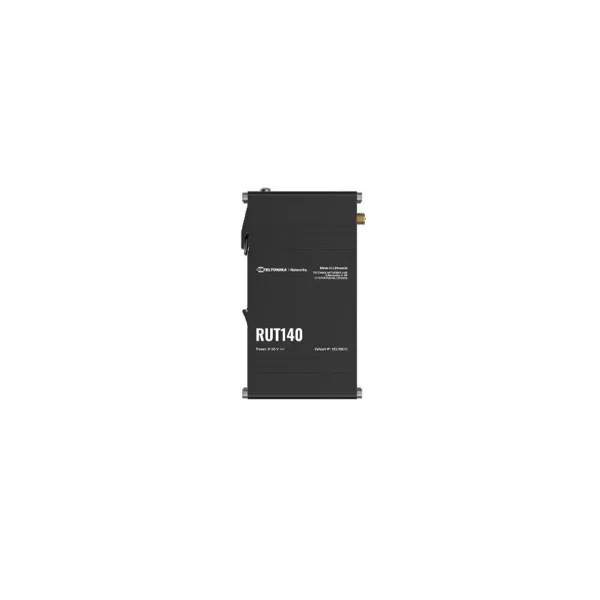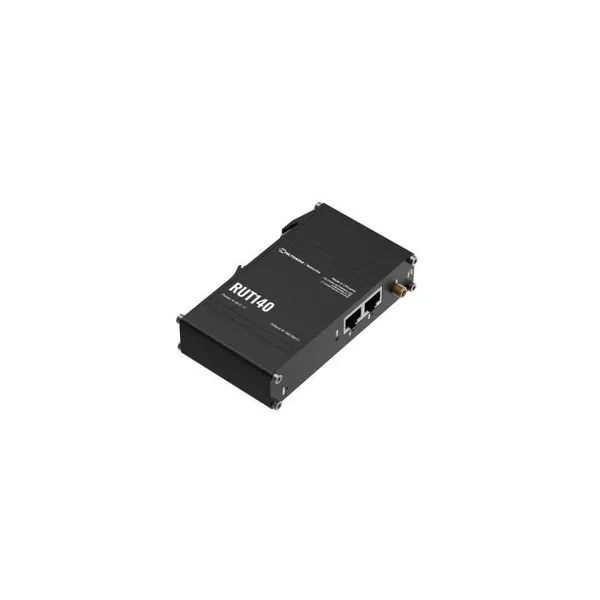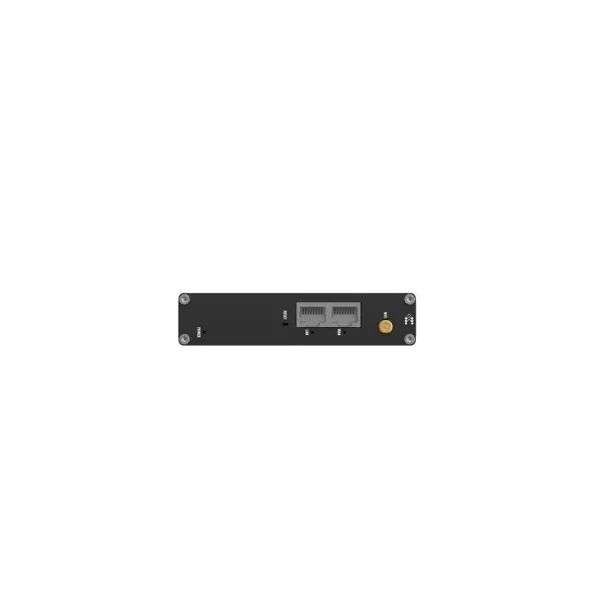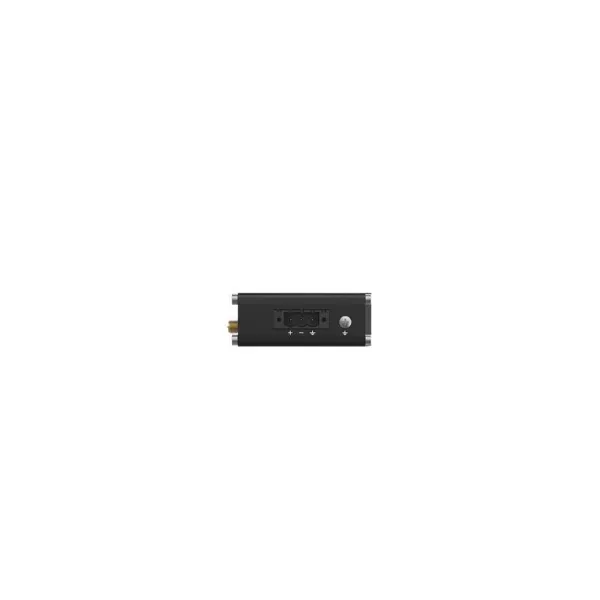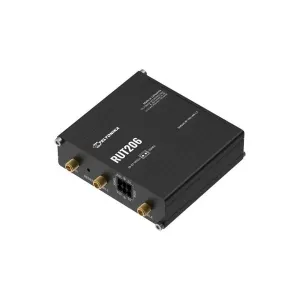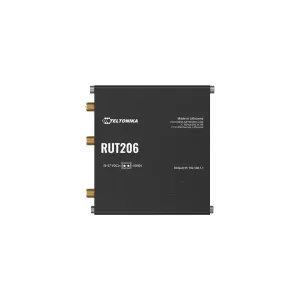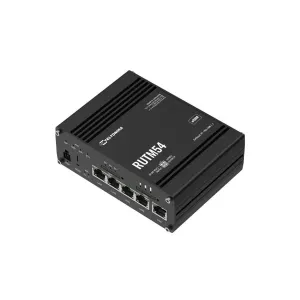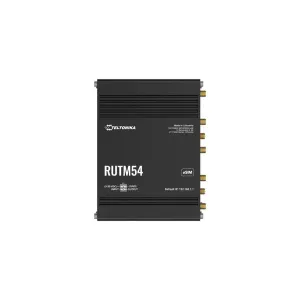Teltonika – RUT140000000 – INDUSTRIAL ETHERNET ROUTER
incl. 19% VAT plus shipping costs
Der RUT140 ist ein kompakter industrieller Ethernet-Router, der die Sicherheit durch Netzwerkisolierung für Endgeräte erhöht. Ausgestattet mit zwei Ethernet-Ports, DIN-Montageschiene und 3-poligem Industriestecker bietet er nahtlose Konnektivität und…
| SKU | 386899 |
|---|---|
| EAN | 4779051840700 |
| MPN | RUT140 |
| Categories | Networking, Routers & Switch |
| Tags | Networking, Router, Teltonika |
Der RUT140 ist ein kompakter industrieller Ethernet-Router, der die Sicherheit durch Netzwerkisolierung für Endgeräte erhöht. Ausgestattet mit zwei Ethernet-Ports, DIN-Montageschiene und 3-poligem Industriestecker bietet er nahtlose Konnektivität und einfache Installation. Der mit RutOS und Wi-Fi 4 ausgestattete Router unterstützt Industrieprotokolle wie Modbus, DLMS, DNP3 und OPC UA und ist mit RMS für ein effizientes Fern- und Vor-Ort-Management kompatibel.
Specifications
WIRELESS
– Wireless mode: IEEE 802.11b/g/n, Access Point (AP), Station (STA)
– WiFi security: WPA3-EAP, WPA3-SAE, WPA2-Enterprise-PEAP, WPA2-PSK; AES-CCMP, TKIP, Auto Cipher modes, client separation
– SSID/ESSID: ESSID stealth mode
– Wi-Fi users: Up to 50 simultaneous connections
– Wireless Connectivity Features: Wireless mesh (802.11s), fast roaming (802.11r), Relayd, BSS transition management (802.11v), radio resource measurement (802.11k)
– Wireless MAC filter: Whitelist, blacklist
– Wireless QR code generator: Once scanned, a user will automatically enter your network without needing to input login information.
ETHERNET
– WAN: 1 x WAN port 10/100 Mbps, compliance with IEEE 802.3, IEEE 802.3u, 802.3az standards, supports auto MDI/MDIX crossover
– LAN: 1 x LAN ports, 10/100 Mbps, compliance with IEEE 802.3, IEEE 802.3u, 802.3az standards, supports auto MDI/MDIX crossover
NETWORK
– Routing: Static routing, Dynamic routing (BGP, OSPF v2, RIP v1/v2, EIGRP, NHRP), Policy based routing
– Network protocols: TCP, UDP, IPv4, IPv6, ICMP, NTP, DNS, HTTP, HTTPS, SFTP, FTP, SMTP, SSL/TLS, ARP, VRRP, PPP, PPPoE, UPNP, SSH, DHCP, Telnet, SMPP, SNMP, MQTT, Wake On Lan (WOL)
– VoIP passthrough support: H.323 and SIP-alg protocol NAT helpers, allowing proper routing of VoIP packets
– Connection monitoring: Ping Reboot, Wget Reboot, Periodic Reboot, LCP and ICMP for link inspection
– Firewall: Port forward, traffic rules, custom rules
– Firewall status page: View all your Firewall statistics, rules, and rule counters
– Ports management: View device ports, enable and disable each of them, turn auto-configuration on or off, change their transmission speed, and so on
– Network topology: Visual representation of your network, showing which devices are connected to which other devices
– DHCP: Static and dynamic IP allocation, DHCP relay, DHCP server configuration, status, static leases: MAC with wildcards
– QoS / Smart Queue Management (SQM): Traffic priority queuing by source/destination, service, protocol or port, WMM, 802.11e
– DDNS: Supported >25 service providers, others can be configured manually
– Network backup: Wi-Fi WAN, VRRP, Wired options, each of which can be used as an automatic Failover
– Load balancing: Balance Internet traffic over multiple WAN connections
– Hotspot: Captive portal (hotspot), internal/external Radius server, Radius MAC authentication, SMS authorisation, internal/external landing page, walled garden, user scripts, URL parameters, user groups, individual user or group limitations, user management, 9 default customisable themes and optionality to upload and download customised hotspot themes
– SSHFS: Possibility to mount remote file system via SSH protocol
SECURITY
– Authentication: Pre-shared key, digital certificates, X.509 certificates, TACACS+, Radius, IP & login attempts block, time-based login blocking, built-in random password generator
– Firewall: Pre-configured firewall rules can be enabled via WebUI, unlimited firewall configuration via CLI; DMZ; NAT; NAT-T
– Attack prevention: DDOS prevention (SYN flood protection, SSH attack prevention, HTTP/HTTPS attack prevention), port scan prevention (SYN-FIN, SYN-RST, X-mas, NULL flags, FIN scan attacks)
– VLAN: Port and tag-based VLAN separation
– WEB filter: Blacklist for blocking out unwanted websites, Whitelist for specifying allowed sites only
– Access control: Flexible access control of SSH, Web interface, CLI and Telnet
VPN
– OpenVPN: Multiple clients and a server can run simultaneously, 27 encryption methods
– OpenVPN Encryption: DES-CBC 64, RC2-CBC 128, DES-EDE-CBC 128, DES-EDE3-CBC 192, DESX-CBC 192, BF-CBC 128, RC2-40-CBC 40, CAST5-CBC 128, RC2-64-CBC 64, AES-128-CBC 128, AES-128-CFB 128, AES-128-CFB1 128, AES-128-CFB8 128, AES-128-OFB 128, AES-128-GCM 128, AES-192-CFB 192, AES-192-CFB1 192, AES-192-CFB8 192, AES-192-OFB 192, AES-192-CBC 192, AES-192-GCM 192, AES-256-GCM 256, AES-256-CFB 256, AES-256-CFB1 256, AES-256-CFB8 256, AES-256-OFB 256, AES-256-CBC 256
– IPsec: IKEv1, IKEv2, with 14 encryption methods for IPsec (3DES, DES, AES128, AES192, AES256, AES128GCM8, AES192GCM8, AES256GCM8, AES128GCM12, AES192GCM12, AES256GCM12, AES128GCM16, AES192GCM16, AES256GCM16)
– GRE: GRE tunnel, GRE tunnel over IPsec support
– PPTP, L2TP: Client/Server instances can run simultaneously, L2TPv3, L2TP over IPsec support
– Stunnel: Proxy designed to add TLS encryption functionality to existing clients and servers without any changes in the program’s code
– DMVPN: Method of building scalable IPsec VPNs
– SSTP: SSTP client instance support
– ZeroTier: ZeroTier VPN client support
– WireGuard: WireGuard VPN client and server support
– Tinc: Tinc offers encryption, authentication and compression in it’s tunnels. Client and server support.
OPC UA
– Supported modes: Client, Server
– Supported connection types: TCP
MODBUS
– Supported modes: Server, Client
– Supported connection types: TCP
– Custom registers: MODBUS TCP custom register block requests, which read/write to a file inside the router, and can be used to extend MODBUS TCP Client functionality
– Supported data formats: 8-bit: INT, UINT; 16-bit: INT, UINT (MSB or LSB first); 32-bit: float, INT, UINT (ABCD (big-endian), DCBA (little-endian), CDAB, BADC), HEX, ASCII
DATA TO SERVER
– Protocol: HTTP(S), MQTT, Azure MQTT
– Data to server: Extract parameters from multiple sources and different protocols, and send them all to a single server
MQTT GATEWAY
– MODBUS MQTT Gateway: Allows sending commands and receiving data from MODBUS Server through MQTT broker
DNP3
– Supported modes: Station, Outstation
– Supported connection: TCP
DLMS
– DLMS Support: DLMS – standard protocol for utility meter data exchange
– Supported modes: Client
– Supported connection types: TCP
API
– Teltonika Networks Web API (beta) support: Expand your device’s possibilities by using a set of configurable API endpoints to retrieve or change data. For more information, please refer to this documentation: https://developers.teltonika-networks.com
MONITORING & MANAGEMENT
– WEB UI: HTTP/HTTPS, status, configuration, FW update, CLI, troubleshoot, multiple event log servers, firmware update availability notifications, event log, system log, kernel log, Internet status
– FOTA: Firmware update from server, automatic notification
– SSH: SSH (v1, v2)
– Email: Receive email message status alerts of various services
– TR-069: OpenACS, EasyCwmp, ACSLite, tGem, LibreACS, GenieACS, FreeACS, LibCWMP, Friendly tech, AVSystem
– MQTT: MQTT Broker, MQTT publisher
– SNMP: SNMP (v1, v2, v3), SNMP Trap
– JSON-RPC: Management API over HTTP/HTTPS
– RMS: Teltonika Remote Management System (RMS)
IOT PLATFORMS
– Cloud of Things: Allows monitoring of: Device name, HW version, Serial number, FW version, WAN IP. Allows actions from the cloud: FW update, Reboot
– ThingWorx: Allows monitoring of: Device name, HW version, Serial number, FW version, WAN IP. Allows actions from the cloud: FW update, Reboot
– Azure IoT Hub: Allows monitoring of: Wan IP, Number of bytes send/received, Model, Manufacturer, Serial, Revision, FW version and collected data of industrial devices
SYSTEM CHARACTERISTICS
– CPU: Mediatek, 580 MHz, MIPS 24KEc
– RAM: 128 MB, DDR2
– FLASH storage: 16 MB serial NOR flash
FIRMWARE / CONFIGURATION
– WEB UI: Update FW from file, check FW on server, configuration profiles, configuration backup
– FOTA: Update FW
– RMS: Update FW/configuration for multiple devices at once
– Keep settings: Update FW without losing current configuration
– Factory settings reset: A full factory reset restores all system settings, including the IP address, PIN, and user data to the default manufacturer’s configuration
FIRMWARE CUSTOMISATION
– Operating system: RutOS (OpenWrt based Linux OS)
– Supported languages: Busybox shell, Lua, C, C++
– Development tools: SDK package with build environment provided
– GPL customization: You can create your own custom, branded firmware and web page application by changing colours, logos, and other elements in our firmware to fit your or your clients’ needs.
POWER
– Connector: 3-pos plugable terminal block
– Input voltage range: 9-30 VDC, reverse polarity protection, surge protection >31 VDC 10us max
– PoE (passive): Passive PoE over spare pairs. Possibility to power up through LAN1 port, not compatible with IEEE802.3af, 802.3at and 802.3bt standards, Mode B, 9 – 30 VDC
– Power consumption: Idle: < 1 W / Max: < 2 W
PHYSICAL INTERFACES
– Ethernet: 2 x RJ45 ports, 10/100 Mbps
– Status LEDs: 1 x WAN type LED, 1 x LAN type LED, 1 x Power LED
– Power: 1 x 3-pin power connector
– Antennas: 1 x RP-SMA for Wi-Fi
– Reset: Reboot/User default reset/Factory reset button
– Other: 1 x Grounding screw
PHYSICAL SPECIFICATION
– Casing material: Aluminium housing
– Dimensions (W x H x D): 113.10 x 25 x 68.6 mm
– Weight: 142.3 g
– Mounting options: Integrated DIN rail bracket, wall mount, flat surface (additional kit needed)
OPERATING ENVIRONMENT
– Operating temperature: -40 °C to 75 °C
– Operating humidity: 10% to 90% non-condensing
– Ingress Protection Rating: IP30
REGULATORY & TYPE APPROVALS
– Regulatory: CE/RED, UKCA, CB, RCM, FCC, IC, EAC, UCRF, WEEE

